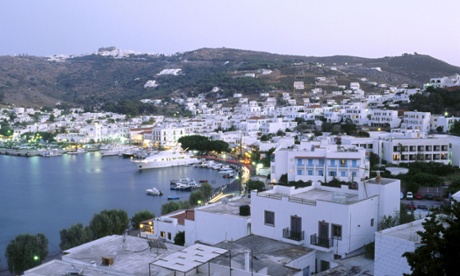
In Patmos you would hardly know there was a crisis. Everything seems just as normal. I have been here for four days with my family, and my Canadian in-laws, and we’ve all had a wonderful time, delighting in the beauty of the island, the delicious food and the warm welcome we’ve received.
There are no shortages of fuel, food or anything else. Restaurants are full. The Patmos Hoteliers Association reports that a total of only 50 nights have been cancelled. If anything, locals report that tourist numbers are higher than last year.
“We’re still laughing,” says Eleni Santouko of Astoria Travel, in the island’s main town, Skala. The only cancellations she’s had are by Greeks, and these were around the time of the referendum. Some Athenians cancelled because they wanted to stay at home to vote.
Patmos, one of the northernmost of the Dodecanese islands, is weathering the current storm because it’s a special island. To the Greeks, it is a holy island. It is the home of the beautiful and renowned Monastery of St John the Theologian, who is said to have written the Book of Revelation in a nearby cave. Founded in 1088, the monastery’s fortress-like walls dominate the island’s skyline.
Patmos is also protected by its relative inaccessibility: the nearest international airports, at Kos and Samos, are both around three hours away by boat, which means it has not been blighted by any huge hotel developments. Beaches are pristine and the whole island has an unexploited, old-fashioned feel.
It is also a foodies’ paradise. In three of Skala’s restaurants – Tsipouradiko (+30 224 703 2803), Trehantiri (+30 224 703 4080) and Chiliomidi (+30 224 703 4179) – the owners catch fish in the morning and serve it that night. Even the simplest beachside taverna is a delight.
“Patmos is a place people fall in love with, and come back to again and again,” says Elina Scoutari, manager of the Porto Scoutari Hotel. “Sixty to 70 per cent of bookings here are by people who have stayed before.”
As a result, the island is in a very different situation to that of the larger islands, which are more dependent on holidaymakers chancing across them as a destination, having found good deals on the internet.
The mood among local people has greatly lightened since the referendum. On the day before the vote, there was a palpable sense of unease: some people I spoke to were reluctant to talk about it, and there was a fear that the country would become dangerously divided. The strength of the No majority has done much to reassure Patmians. The vote also seems to have given them a welcome sense of catharsis: finally, they have had a chance to take action, rather than passively wait on events.
Apocalyptic news reports in other countries are met with incredulity. “There is a problem in Greece, but it’s not nearly as bad as people are saying,” says Vassilis Gryllis, manager of Skala’s oldest cafe, the Bar Plaza.
“I just talked to someone in Denmark who’d heard there were no boats between the islands,” says Chrissa Gryllis, manager of T&G Car Rental. “The boats are running better than ever. There are no shortages that I know of. Things are only hard for the [mainland] Greeks.”
“There is no shortage of petrol here,” says cab driver Michael Grammaticus. “We had a big delivery of fuel just three days ago.”
“The only shortage I have is money,” says Acoumina Karavis. The cash machine of the local National Bank of Greece is working as normal, and tourists with foreign accounts can withdraw freely, but locals can only draw out €60 per day.
“The only thing to be careful of is changing foreign banknotes,” says Chrissa Gryllis. Exchange restrictions meant her visiting mother was unable to change her Australian dollars. “It’s better to change banknotes before you come.”
But beneath the smiles there is, of course, a great deal of anxiety. People are hoping the uncertainty will not drag on too long. Eleftheria, who works at the Rouge Parfumerie, is concerned about the timing of the crisis: “Things are all right now, but August is our main season.”
Elina Scoutari adds: “Come to Patmos! Enjoy! My hotel, Porto Scoutari, is almost fully booked for the whole summer right now, but we will gladly help you find another place. Or come in September: the sea is warm, the sun shines, and it’s a beautiful month here.”
Most of all, though, the message the people of Patmos want to drive home is that all is fine here. “Come to Greece and don’t be afraid,” says Vassilis Gryllis. It is a message with which I would wholeheartedly agree. It’s a true pleasure to be able to show support for Greece.

